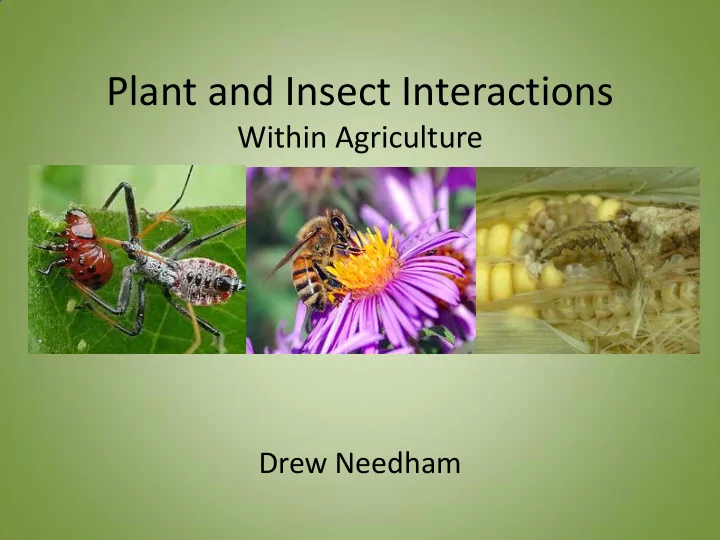

Plant and Insect Interactions Within Agriculture Drew Needham
Outline • There is going to be a focus on plant-insect relationships in specifically agriculture • Background • Beneficial Ecosystem Services by Insects • Detrimental Ecosystem Services by Insects • Conclusion and Closing Remarks • Time for Questions
Background Why is this important? • Some perspective -There are over 900,000 species of insects known (80% of known species) -200 Million Insects/ human, 300 lbs of insects/ 1 lb of human • 75% of crops rely on insect vectors for pollination, and insect pollination services are valued at $200 Billion worldwide each year (Natural Environment Research Council)
Beneficial Ecosystem Services • Insects provide many beneficial services that directly and indirectly affect crops and other plants • Many of the plant-insect relationships are mutualisms -Mutualism: Where both parties in the relationship benefit from the other • Services provided: -Pollination -Nutrient cycling -Dung burial -Natural control of plant pests (Zhang et al., 2007)
Pollination • The three main orders of insect pollinators are hymenoptera (bees and ants), lepidoptera (moths and butterflies), and diptera (true flies) • Some species are generalist pollinators, and others can be very specific • Usually a mutualistic relationship
Pollination • One of the most common and famous pollinator is the honey bee (family Apoidae) - Generalist pollinator -Some plants must have honey bees (apples, sweet clover, squash, etc), while other plants are generalists (eggplant, soybean, pepper, etc) (UIUC)
Pollination • The yucca-yucca moth relationship is an obligate mutualism for both parties -The yucca can only be pollinated by the yucca moth -The yucca moth oviposits exclusively in yucca plants, larvae feed on seeds (Pellmyr et al., 1996) -Coevolution
Nutrient Cycling • Nutrient cycling -Many insects help to initially breakdown dead organic material -Flies and carrion beetles often feed on carcasses -Caddis larvae and caterpillars often feed on plant material -Helps to release stored nutrients back into the soil for future plant use
Dung Burial and Removal • Animal waste has many stored nutrients needed for plant growth • Dung beetles (Family scarabaeidea) remove waste and store it underground • The stored dung not only provides nutrients to plants, but also improves the soil structure (Zhang et al., 2007) • Added bonus for farms with both livestock and crops
Natural Pest Management • There are a plethora of insects that are detrimental on plants, and fortunately, just as many insects that detrimental on the pests • The Colorado Potato Beetle is the classic example of an agricultural pest controlled by beneficial insects, like Lebia grandis , a ground beetle of the family Carabidae (Hooks, 2013)
Detrimental Ecosystem Services • Insects are responsible for BILLIONS of dollars of lost profits each year due to loss of yield and costs associated with pest management • Insects can be detrimental in a variety of ways, but there are three main areas: -Herbivory -Competition for water -Disease transmission
Herbivory • Herbivory is feeding on plants • The most common means by which insects tend to be pests • Have direct and indirect negative impact on yield • The corn earworm, Helicoverpa zea , is caterpillar that alone incurs $2 Billion dollars in costs each year (Lopez et al., 1999)
Competition for Water • Insects and plants both require water for survival • The presence of insects, especially in large number, will decrease water availability • Can be especially damaging in drought conditions, and costly if additional irrigation is required (Zhang et al., 2007)
Insects as Disease Vectors • Many different Insects act as vectors for numerous plant diseases • Whiteflies, hemipterans of the genus Bemisia, are notorious crop pests due to the many different plant diseases they transmit • Whitefly-born diseases include, lettuce infectious yellows virus, asystasia golden mosaic virus, and African cassava mosaic virus (Brown et al., 1995)
Conclusion and Closing Remarks • Insects play a major role in agriculture due to their close relationships with plants • There are numerous beneficial services provided by insects in agriculture, many of which are mutualistic • Insects also cause many problems for plants via a variety of mechanisms • Many of these plant-insect relationships are very delicate and have coevolved over time • Due to our dependence on agriculture as well as the services insects provide, humans need to be sure to maintain balance through proper management practices
Questions? Thank you Ladybugs and Gentlemantids
Recommend
More recommend